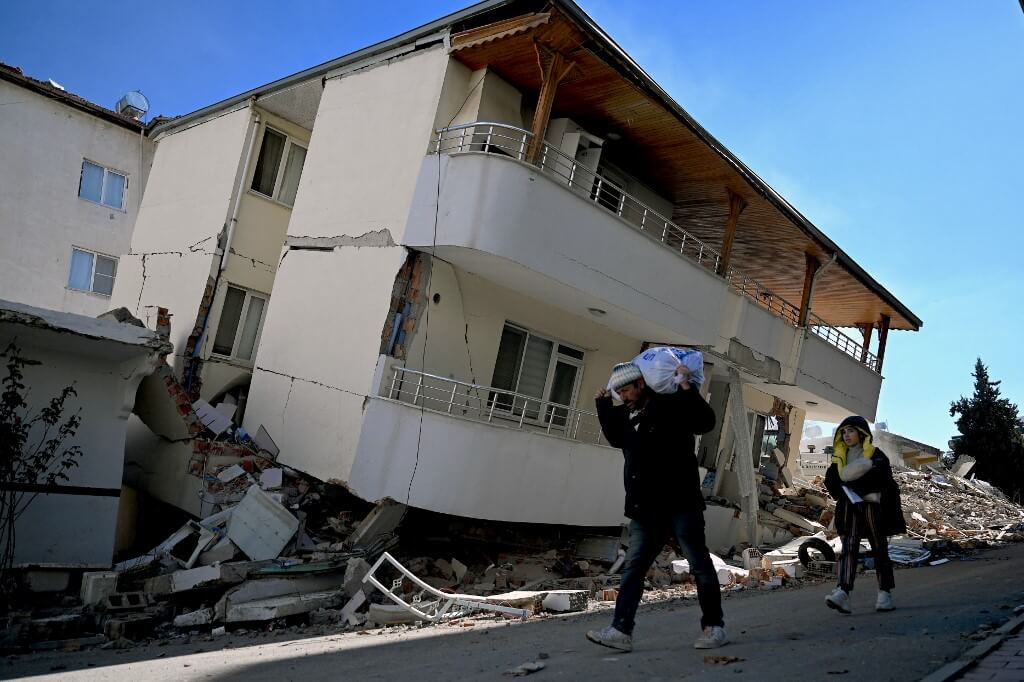A Turkish volunteer runs down a pile of rubble, dragging a Syrian man with a bloodied face as last week’s catastrophic earthquake escalates migrant tensions.
“He was stealing!” the volunteer screams, echoing looting charges levelled against migrants across the ruins of Antakya and other cities flattened by last week’s quake.
The 7.8-magnitude earthquake killed nearly 40,000 people in southeast Turkey and parts of Syria, laying to waste a region filled with families that fled the 12-year Syrian war.
And it appears to have inflamed resentment against foreigners in Turkey, home to the world’s largest population of people fleeing conflict zones.
Turkey has accepted around 5 million people — including nearly 4 million from Syria — helping the European Union stem a crisis in 2015-16.
But that generosity reached its limit when Turkey’s economy imploded and the cost of supporting refugees became a concern in late 2021.
President Recep Tayyip Erdoğan and his political rivals began pledging to send Syrians back home heading into a crucial election planned for May 14.
While the status of that vote now looks uncertain, with the entire nation focused on quake relief work, AFP reporters in Syrian border regions witnessed vivid examples of flaring ethnic tensions.
“While Turkish people are trying to save lives, the Syrians are searching for money, for gold,” claimed Baki Evren, 43, walking around the collapsed buildings of Islahiye, a town in a multi-ethnic region filled with migrants.
“We are frustrated, naturally.”
Beacon of tolerance
Much of the anger centers around accusations of looting and theft.
The quake flattened thousands of buildings, spilling people’s possessions out on the streets.
Turkey has imposed a state of emergency across the quake zone, allowing the army to intervene and the police to take extra security steps.
But resources are scarce and nerves are fraying in places such as Antakya, an ancient crossroads of civilizations that became a beacon of cultural and religious tolerance in Turkey.
Minutes after the Turkish search and rescue volunteer hauled away the bloodied Syrian, a man in a neon first-aid jacket accosted another migrant who was holding a half-filled plastic bag.
As a small crowd rushed in to hurl accusations at the alleged looter, a young Turkish woman stepped in to defend the Syrian.
“He is my employee,” the woman interjected. “He has permission to go and collect my things.”
A security officer who arrived at the scene confirmed the woman’s story.
But this did not appease İbrahim Iğır, one of the men in the irate crowd.
“While people are screaming under the ruins, these bastards are stealing their property,” he alleged.
‘All your fault’
Ahmad Derviş, a 28-year-old Syrian father with two daughters in a stroller and a 19-year-old wife, struggled to understand the resentment.
“The earthquake hit all of us. We are all suffering,” said Derviş, who left Syria’s Idlib province in 2011 and now lives in a tent city in Islahiye.
He recalled how a group of his Syrian friends were lining up to receive state assistance after the earthquake.
“And some [Turks] began shouting and saying, ‘This was all your fault.’ What have we done?” he mused.
“Whatever happens, they blame us.”
Ahmad Salami, a 31-year-old with five children who came from Syria’s Hama district, said he spent the first days in the rubble looking to save lives — not steal.
“When the earthquake first struck, I rushed in to help because there was nobody else,” Salami said.
“I pulled out 20 people from the rubble — 11 Turks and nine Syrians — on the first day. I didn’t go there to steal.”
Wadda, a 35-year-old Turkish construction worker in Antakya, admitted the anger towards Syrians was misplaced.
“The first people to loot the shops were Turks. But no one says that,” said the man, who refused to give his last name.
© Agence France-Presse



